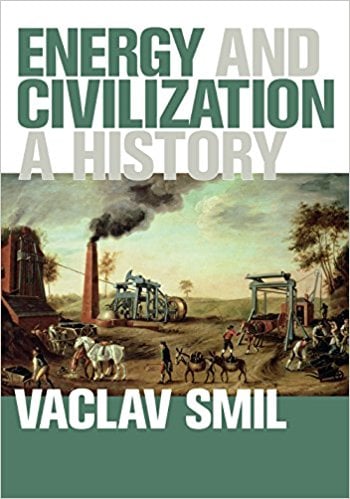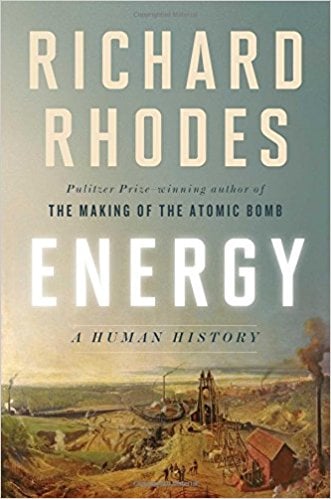You have /5 articles left.
Sign up for a free account or log in.


Energy and Civilization: A History by Vaclav Smil
New edition published in May of 2017.
Energy: A Human History by Richard Rhodes
Published in May of 2018.
The energy world that I want is not going to be the energy world that we are likely to get.
That is my depressing conclusion after spending 31 hours and 57 minutes immersed in the audiobook versions of arguably the 2 best histories of energy ever written.
These books are Energy and Civilization: A History by Vaclav Smil (20h 9m) and Energy: A Human History by Richard Rhodes (11h 48m).
Smil, if you don't know, is Bill Gates' favorite author. You can read his review Energy and Civilization here. My money is on Gates reading and recommending Energy: A Human History. Not only is this book the perfect companion to Energy and Civilization, reading Richard Rhodes is an absolute pleasure.
Usually, the more I learn about the world the more optimistic about our future I become. Ask me about the future of health, employment, or education - and I’ll tell you that our grandkids will have it better than us.
After reading these 2 books, my faith in the future of energy has been a bit attenuated.
Sure, on most measures - cost, availability, etc. - the world’s energy situation will improve. It will. Our grandkids, and more importantly the grandkids of those living today's emerging economies, will lead better energy lives than today.
It is more that the changes in the energy mix in the United States will come more slowly than I had hoped.
Here are my 3 depressing conclusions about the future of energy from reading these books.
1 - The Transition to Clean Energy Will Come More Slowly Than I Hoped:
The big thing you learn in reading these 2 books is just how slowly energy transitions occur. We tend to think of the 20th century as the age of oil. But in reality, the world generated more energy from coal in the last century than from oil. It is not that oil does not dominate the world economy, as it is today the world's most valuable traded commodity. It is just that so much coal was burned in the 20th century.
Transitioning to clean renewable energy sources, to solar and wind and hydro, will take longer than any of us want. The reasons are many.
Today, electricity must basically be consumed at the same time, and at the same rate, that it is produced. Methods to store generated electricity are prohibitively expensive. Since the sun does not shine and the wind does not blow all the time, the transition to solar and wind energy will be delayed until battery technology improves radically.
Fossil fuels, on the other hand, are energy dense and storable. The US is now the largest oil producer in the world, thanks to fracking. Proven reserves of affordably recoverable natural gas - again thanks to fracking - will accelerate the transition from coal to gas for electricity generation.
The transition to clean energy will eventually arrive. But after reading these 2 books, I’m now thinking that this shift may be 50 years away. It is depressing to thinking of this century as the century of gas, but I’m afraid that is where we are.
2 - We Are Missing A Great Opportunity When it Comes to Nuclear Power:
Nuclear power comes off looking really good in these 2 books. Rhodes is particularly persuasive about the potential of nuclear.
Nuclear is the only electricity generating method that is both constant and carbon free. (Hydro generation is constant and clean as well, but there are simply not enough places to build enough hydroelectric dams to meet demand).
Today, nuclear produces about 20 percent of U.S. electricity. Even as new designers for nuclear plants have been shown to be incredibly safe, there are almost no plans to build new plants. The political will and financing simply are not there.
Gas generated electricity is too cheap when compared to nuclear, even though natural gas is a significant contributor to atmospheric carbon dioxide.
The history of nuclear power is fascinating. I had not realized how tightly the technological history of nuclear power is tied to the development of nuclear submarines.
I came away from reading these books with a much more favorable impression of nuclear power. The arguments that nuclear waste is a manageable challenge, that nuclear power is safe, and that nuclear is a workable solution to reducing carbon emissions makes more sense to me now.
If you disagree with this conclusion about the wisdom of nuclear power, please read these books, and then get back to us.
3 - The Switch from Gasoline to an Electric Cars Will Be Painfully Slow:
I am really hoping that I never buy another gas powered internal combustion engine car again.
I am really hoping that the next car that I buy is electric. Even better would be solar panes on my roof to charge the car.
Reading these 2 books makes me think that I will not get my wish.
Again, the issues are costs.
Gasoline processed from crude oil remains abundant, cheap, and energy dense. Electricity derived from solar and stored in batteries remains expensive and inconvenient.
We know that the future is electrically powered (and self-driving) vehicles.
We know that the future is distributed power generation, with home solar arrays and battery storage.
We know all this, but this transition is likely to come slowly.
Sometimes, I fantasize that American’s pay the true cost of the gas that we consume. That the portion of the $700 billion or so our country spends on defense to keep oil producing nations afloat, and oil shipping lanes open, get reflected in what we pay at the pump.
And I fantasize about a carbon tax. That we pay for the privilege of burning carbon and putting CO2 in the atmosphere.
How much more quickly would the transition to clean energy come if we paid the true costs of our carbon-based fuels?
Not going to happen, I know. But fun to think about.
These are excellent, important, maybe even must-read books. Energy is a topic that should be woven into every major, every discipline, and every field of study.
If I can think of one topic that every student and every professor at every college campus should be learning more about, it would be the past, present, and future of energy.
Are you less depressed about our energy future than I am?
Do you have solar panels on your roof and do you drive an electric car?
What books on energy would you recommend?




